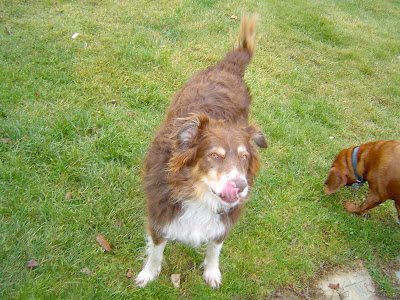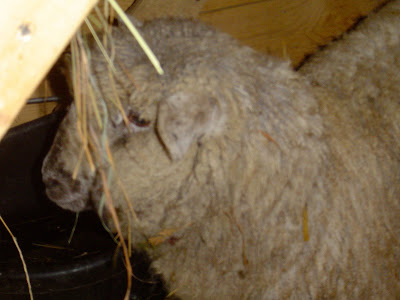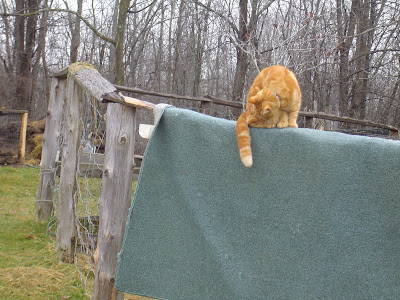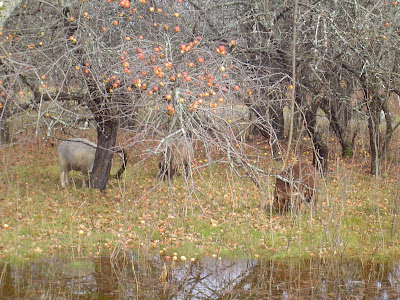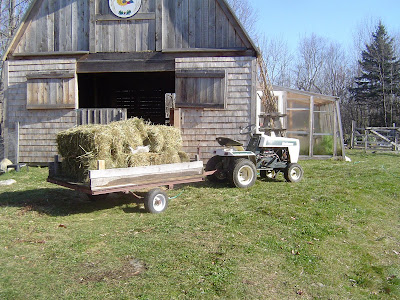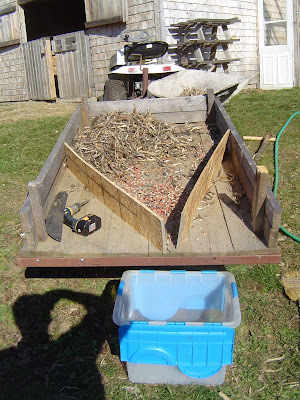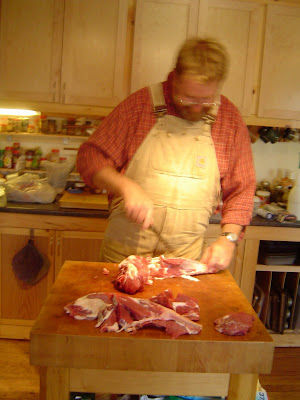Snow again, second late fall snowstorm we've had. It wasn't supposed to, except in the north of the state, but a nor-easter was running past Nova Scotia last night and I guess it veered west and we got clipped.
Two inches of wet sloppy stuff on the ground. The kind of stuff that sticks even to 12 gauge sheep fence. I went out with the dogs to let them piddle at 3.40 am and there it was, all the fences bright white in the moonlight. Christmassy. There had been a bit before bed, but not sticking to the ground or the fences.
The coyotes were howling loud and close too, within 200 yards. Maybe they don't like snow.
The old timers say they would always have a few inches on the ground and staying there before Thanksgiving. These days we get a little sloppy stuff, then another late fall heatwave drives the temperatures up to 55 or 60 degrees again and it melts (degrees F).
This would be the day to go hunting deer. Most hunters around here use the "still hunt" system, letting deer come to them on deer tracks and runways, often using tree stands, but a quiet hunter with a high degree of patience can stalk whitetail, and the fresh snow helps immeasurably. If you live in the kind of place that we do, with thousands of acres of forest all around, simply go out your back door at first light and into the woods and cut for sign, looking for a large enough, lone track in the snow, large enough that it could be a buck. As long as the track is only walking, not running or leaping, follow it closely and quietly and move only when you are sure you are not within fifty yards, and you will eventually see the deer, hopefully before it sees, smells or hears you. Deer tend to bed down soon after first light, and so if the animal has not been disturbed by you or another hunter, you won't usually have to track it far before you see it.
Of course, this makes it sound easy. Only a minority of hunters can more this quietly and observe this well.
Coyotes are worrying.
Canis latrans is really a kind of dwarf wolf, same genus, different species as
Canis lupus the grey wolf. I wonder what our sheep think when they hear the coyotes howl? Do they feel scared and huddle closer to one another?
These small wolves have never to our knowledge crossed our fence, but I bet they've patrolled every inch of it.
The sooner we get Snorri to do his tupping job and then all the sheep together in the barn each night the better. Once Snorri is gone, with Abe already gone, all the sheep can go in the barn early this winter.
Our neighbor Hamilton is a serious coyote hunter and very skilled, and will likely shoot more than one of these this fall, as long as they are silly enough to come this close to his house. If I were a coyote, I wouldn't go anywhere near Hamilton's house. It's a death warrant.
Which is good for us, since the coyotes are so thick this year. If they get scared off before lambing season, I'm happy about that.
I guess we live right on the edge of civilization here, and it's touch and go whether human activities like sheep farming win out, or whether these few remaining old Great Farm clearings get abandoned to coyote and deer and grow up to be thick forest again. Most of the woods behind our house are second growth, old field
successional stands of about 30-40 years age at the most. There are few areas with the large trees, hummocking and rocks that would be present in old forest. The older locals refer to the massive ash grove that starts where our leased land sits as the "hundred acre hayfield," indicating that it was cleared and used during the Great Farm heyday and in fact long after.
But then it was abandoned, and now the coyotes and whitetail and white ash make use of it. The woods now stretch for miles unbroken behind our house. It's touch and go whether we will even maintain the human trails. Hamilton does most of that.
Without Hamilton's shooting and trail-clearing and my clearing of trees for firewood and forage, and the sheep eating the shoots of young trees, and our efforts to maintain our homes, the tiny clearings we live in around here would be greenwood in a few years too, our houses would fall into their cellar holes, and one tiny spot on the planet would go the reverse direction of every other spot, and actually become less civilized.
I'm not sure that would be such a bad thing, but neither Hamilton and I can really help ourselves. He's a hunter, I'm a farmer, and we do what we do. The coyotes and deer do what they do. If they let us, we will shoot them, eat the deer, cut the trees, grow the sheep, stay warm and fed. If we let them, they will make their home here where we make ours, and trees will grow up through the rubble of our homes.
We are all forces of nature: coyote, whitetail, white ash, hunter, farmer. Different traditions, different niches, different powers and weaknesses, all in tentative shifting balance on one small spot on a planet where most everywhere else humans have the upper hand.
It won't be the coyotes, deer or trees that will destroy our houses, though, if we don't look after them. It will be the snow and wind and rain.
That's the real force of nature around here that we all must contend with. I don't say do battle, because I don't like the analogy much. I don't fight it. It's not a war.
I just get up in the morning and scratch my head and go out to my shop and get some tools and do some carpentry, some painting, some firewood cutting.
It's just a job of work. Ho hum. Eight hours and then a nap, and admire what you did the next day. I am glad that I have a vocation that has a beginning, a middle and an end, and for which there is something to see when you are done.
And nothing to spin. Either done well or not. Or not done at all.
There are of course folk all around who do not or cannot work, and you see their houses and especially trailers slowly becoming rubble while they live in them. A trailer, I think, is in fact designed for someone who doesn't want to, or can't work. They will last for twenty years, thirty at the outside, and you just let them go, really. A minority are fixed up in time, but the materials used don't really make this easy.
Stone and wood don't rust or break off in the wind. Plastic and metal do.
A Yorkshireman, I think, does well in the Maine woods because we were taught by our fathers and grandfathers and all the foul-mouthed tradesmen we worked for as youth to
shift. When I was a kid, and before I went in the service, I worked as a laborer for a couple of guys, a nurseryman and a stonemason, who had no compunction whatsoever about cursing me out if I rested on my shovel. I hated them, at the time, of course, but I wanted the pay packet too, the
brass. And I learned that the way to independence of thought was to get skilled as a tradesman.
That old Yorkshire word shift, the root of the somewhat more commonly used word "shiftless."
I have to stop writing this now and go build on our barn with my students. Some of them definitely are shiftless. Most are not. But those who are, is it their fault, in these days of cell-phones, Twitter and mall-rat syndrome?
We do what we can to help them learn to shift.
If we don't help them learn to shift, of course, all kind of uncivilized elements will enter their lives and begin to break down the fabric, turning youth and energy into burnt-out rubble, and, in the collective, further reducing the value of civilization for the rest of us.



